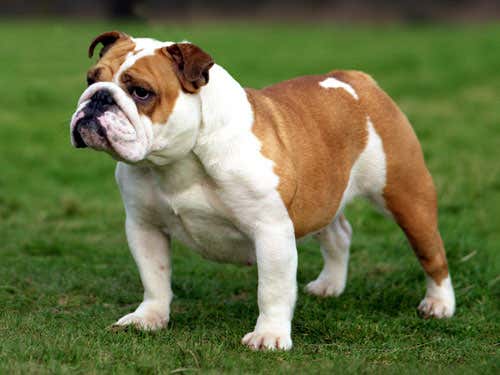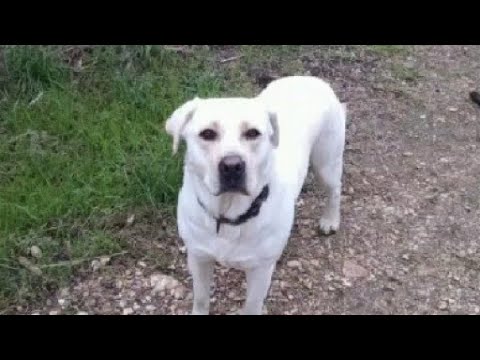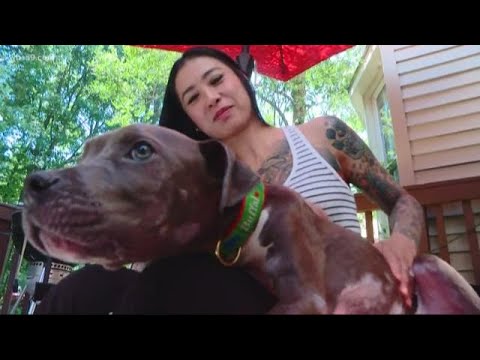 In This Chapter
In This Chapter- Understanding how breeding changes your dog
- Breeding: A hard road to travel
- Examining the cost of Bulldog breeding
- Preparing for loss
Your Bulldog’s biological clock is not ticking. Having puppies does not “fulfill” your bitch or “complete” your male. Breeding may make you feel good and instill a sense of pride in your dog, but that’s a selfish reason to breed your Bully. And because Bulldogs are bred artificially, “What’s love got to do with it?” (to quote Tina Turner). Absolutely nothing! For Bulldogs especially, breeding comes with a huge set of complications, which are covered in this chapter. Before you get your heart set on breeding your Bulldog, please read this chapter.
Assessing the Health Risks to Your Bulldog
Male Bulldogs who have not been neutered have a greater chance for testicular tumors and prostate cancer. Risks of mammary tumors and ovarian cancer increase in females who remain unspayed. Females frequently get bladder infections following a heat cycle. Pyometra, which can be a fatal ailment for female Bulldogs, is an infection of the uterus, more specifically an accumulation of pus in the uterine cavity. Medical treatment can be lengthy, expensive, and often unsuccessful. Spaying a bitch with Pyometra can cost over $1,000. Spaying your puppy, on the other hand, is closer to $200. Spaying your puppy is an important step in prevention and will also save you money.
Dealing with Behavior Problems
An intact male may want to mark his territory, which can include the corner of your sofa or the brand-new pair of shoes you bought last week. Intact males can be more aggressive when defending their right to a female in heat. Females in season may be a bit cranky as well, aggressively attacking other females.
Having to Separate Your Love Birds (I Mean Bulldogs)
If you have Bulldogs of both sexes, you may want to board one or the other of the dogs while the bitch is in season, adding another price between $200 and $1,000 for at least 3 weeks of boarding each year.
Tackling the Messier Details
If your bitch is in season, you may want to confine her to one area with a washable floor instead of letting her have access to the imported oriental rug. Otherwise, you may be following your Bully around with a bucket of soap and water to clean up after her. Who has that much time? One alternative to doggy solitary confinement include using doggy diapers. Washable diapers run about $20 apiece. Sanitary panties have a place to insert a sanitary pad. These panties cost between $15 and $20. Pads cost around $5 for 10 or 15, depending on where you shop. Not cheap!
Tip
Because of the way Bulldogs are built, they can’t reach to clean themselves. You have to keep your dog clean. Also keep in mind that some females can develop an intense hormonal smell (frankly, they can really reek!). Regular attention to your dog’s hygiene will help her stench go away.
Testing, Testing, and More Testing
Make sure that your bitch is ready to be bred. Tests need to be run, above and beyond any health checks that you decide to do, before breeding. Don’t forget the cost of the actual insemination:
– Progesterone testing and vaginal smears usually run $80 to $100 each, with four to six tests needed per breeding.
– Artificial insemination usually costs $100 to $300. This includes only the insemination process, not the cost of the actual semen!
It’s the Human Who Becomes the “Mommy,” Not the Bulldog!
Bulldog puppies are hand raised. Having a bitch with puppies is a time-consuming process with any breed, but with Bulldogs, the amount of time is even greater. Say goodbye to your vacation on a tropical island, because the time off is essential for you to raise your new puppies. If the bitch has milk, she needs to nurse her litter, but you need to get up every 2 or 3 hours to put the puppies on the nipples. Make sure that all the puppies suck properly. Hold each one, and let the mother clean them after they’ve eaten. If you’re thinking that you already don’t have enough time for the process, let alone vacation time, think about hiring someone to take care of the puppies (add a sitter to your list of costs).
The puppies need to be in a separate box to prevent the mother from accidentally lying on them. If the mother doesn’t accept them for nursing and cleaning, you need to do the entire job, from bottle or tube feeding to using a cotton ball to stimulate them to defecate and urinate.
Three (Or More) Is a Crowd
Before the puppies were born, you may have thought you had homes for those puppies, but things can change. Remember, those puppies are your responsibility. If you can’t find homes for two or three . . . or four puppies, you must care for them until you do. That means separate crates, vaccinations, beginning to housetrain them, and the work of socializing those puppies, not to mention food and cleanup.
If you breed your Bulldog, you must be prepared to care for the puppies you produce!
Bulldog Breeding Is More Technical than Natural
Bulldogs are rarely ever bred naturally. Breeding occurs completely through artificial insemination, which is a costly fee. You also pay to have the semen (fresh, chilled, or frozen) shipped. Collecting and shipping fees are in addition to whatever stud fees you’ve agreed upon.
Subjecting Your Dog to Cesarean Section
Bulldog puppies are delivered by Cesarean section (C-section) — another veterinary bill for your files, this time, anywhere from $600 to $2,500, depending on where you live and how complicated the operation becomes. Also, vets don’t guarantee any live puppies from a Cesarean section. Either way, you pay.
Adding Up the Bill
This chapter covers a lot about Bulldog breeding that costs a lot of money, but have you considered how big the bill is when you add up these costs? These costs can have a real financial impact! Consider the list, and add away:
– Common health ailments from breeding (including cost for treatment and removal of tumors):
- Mammary tumors: $300 and up
- Testicular tumors: $350 and up
- Prostate problems: $300 and up
– Spaying ($100 to $200) or neutering ($75 to $150)
– Boarding: $200 to $1,000 twice a year
– Dog supplies (Doggie diapers, milk, cotton balls; the hidden extras):
- Diapers: $20
- Sanitary pads per season: $25
- Whelping box: $30 to $75, depending on whether you make it or buy it
- • Hard-sided kiddy wading pool: $5 to $10
- • Supplemental puppy formula: $30 for 28-ounce size dry
- • Small nursing bottle with four nipples: $3.50. (Extra nipples: $3.)
- • Heating pad or heat lamp: $20 to $30
– Artificial insemination, including office visit, vaginal smear, progesterone testing: Anywhere from $145 to $250. You usually do this at least twice, so double those figures.
– Collecting and shipping chilled semen: $180 to $250.
– Surgical implantation, if using frozen semen: $300
– Stud fees: $500 to $1,000 (generally nonrefundable)
– Health checks for breeding:
- Vaginal smears and progesterone testing: $80 to $100 up to six times
- Physical, including blood work: $65 to $150
– C-section: $600 to $2,500.
Facing the Likelihood of Heartbreak
Breeding is not for the faint of heart. You may lose puppies — some before you get to know them. You work and worry and fuss over a puppy, and she may die anyway. Sometimes it’s not the puppy who dies, but the mother. Are you willing to risk losing the girl you’ve had since she was a puppy? Are you prepared to give up sloppy kisses and cuddling on the couch? As expensive as purchasing a Bulldog puppy may be, it’s much easier to write checks for purchase and spaying or neutering than to breed a litter.
Tip
As bad as it is to lose a puppy, losing the mother is heartbreaking, and that is a danger every time you breed. One breeder, after a particularly hard whelping, said if she could find the person who told her breeding was fun, she’d “nail him to a tree.” Another friend, with a different breed, had a bitch who was just huge with puppies. As she was talking to her veterinarian on the phone, discussing having a C-section, because of the size of the coming litter, she heard a thud. The bitch had dropped dead; the mass of puppies pressing on her heart had been too much for her.
An intact male that is used at stud is more apt to mark his territory in the house and more likely to be aggressive toward other males. There is the risk of testicular tumors and prostate problems. Using a dog at stud is not like an anonymous sperm bank. Breeders want a dog that fits the standard, and generally, they want to breed to a champion. That means spending the time and money to go to enough shows to earn the points needed to win that title. And there are still the time and effort needed to collect the semen and have it chilled or frozen and shipped.
Remember
Good breeders know the danger signs of a bitch in whelp not doing well. It is very hard-won knowledge. Reputable breeders try to discourage people who just want a pet from breeding for all the above reasons.
by Susan M.Ewing






